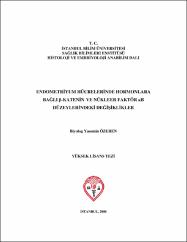| dc.contributor.advisor | Koyutürk, Meral | en_US |
| dc.contributor.author | Özeren, Yasemin | |
| dc.date.accessioned | 2014-06-04T11:17:23Z | |
| dc.date.available | 2014-06-04T11:17:23Z | |
| dc.date.issued | 2008 | |
| dc.date.submitted | 2008 | |
| dc.identifier.citation | Özeren, Yasemin. (2008). Endometriyum Hücrelerinde Hormonlara Bağlı β-Katenin Ve Nükleer Faktör Kb Düzeylerindeki Değişiklikler. Yayımlanmamış yüksek lisans tezi. İstanbul : İstanbul Bilim Üniversitesi, Sağlık Bilimleri Enstitüsü. | en_US |
| dc.identifier.uri | https://hdl.handle.net/11446/85 | en_US |
| dc.description | İstanbul Bilim Üniversitesi, Sağlık Bilimleri Enstitüsü, Histoloji ve Embriyoloji Anabilim Dalı Yüksek Lisans Programı. | en_US |
| dc.description.abstract | Bu çalısmada in-vitro endometriyum hücre modelinde, progesteron ve östrojen
hormonlarına baglı olarak gelisen endometriyal siklus evreleri ve sinsistyotrofoblastlarca
sentezlenen insan koryonik gonatotropin hormonuna baglı olarak beta-katenin ve nükleer faktör KB (NF-KB) sinyal yolakları ile hücre proliferasyonunda meydana gelen degisiklikler immünositokimyasal olarak incelendi.
Hücre proliferasyonunun degerlendirilmesinde S fazına özgü bir isaretleyici olan
bromodeoksiüridin (BrdU) immünositokimyası uygulandı. Östrojen inkübasyonu sonrasında BrdU inkorporasyonunda artıs izlenirken, progesteron ve insan koryonik gonatotropini uygulaması sonrasında hücre proliferasyon oranlarında bir degisiklik izlenmedi. Endometriyal hücrelerde, plazma membranının intraselüler sınırları boyunca belirgin beta-katenin ekspresyonu izlendi. Östrojen ve progesteron hormonlarıyla inkübasyon sonrasında mevcut Beta-katenin ekspresyonunda bir degisiklik izlenmedi. İnsan koryonik gonatotropini (HCG) ile inkübasyon sonrasında ise membran yerlesimli beta-katenin ekspresyonunun azaldıgı izlendi. NF-KB aktivitesi, östrojen ve HCG uygulanan deney grubu hücrelerde kontrol grubuna benzer bulundu. Ancak progesteron uygulanan grupta sitoplazmik NF-KB ekspresyonunda artıs izlendi.
Çalısmamız sonucunda; östrojen hormonu inkübasyonuyla artan S faza özgü BrdU
pozitif hücre oranı bu hormon kontrolündeki siklus evresiyle uyumlu bulundu. Plazma
membranında lokalize olan adezyon molekülü beta-katenin ekspresyonunun, insan koryonik gonadotropini etkisiyle azaldıgı belirlendi. inflamasyon kontrolünde rol oynayan ve steroidlerle etkilesen NF-KB ekspresyonunun, progesteron hormonuyla iliski gösterdigi ancak sinsityotrofoblastlar tarafından salınan insan koryonik gonadotropininden bagımsız bir etkigösterdigi sonucuna varıldı. | en_US |
| dc.description.abstract | In this study, in in-vitro endometrial cell model, estrogen and progesterone dependent endometrial cycle stages and beta-catenin and nuclear factor kappaB (NF-kappaB) signaling pathways in terms of human chorionic gonadotropin (HCG) hormone that is synthesized by syncytiotrophoblast cells, and changes in the cell proliferation are examined
immunocytochemically. To assess cell proliferation, S-phase specific marker bromodeoxyuridin (BrdU)
immunocytochemistry was performed. While an increase in BrdU incorporation was observed after estrogen incubation, there was no change seen in cell proliferation rates after progesteron and HCG applications. In endometrial cells, distinct beta-catenin expression was observed across
the entire intracellular margin of the plasma membrane. After incubation with estrogen and progestogen, no change in the expression of existing beta-catenin was noticed. Also, a significant decrease was observed in membrane-bound beta-catenin expression after incubation with HCG.
Compared with estrogen and HCG treated experimental cell group, NF-kappaB activity was found similar to that of the control cell group. On the other hand, in the progesteron treated group, an increase was observed in cytoplasmic NF-kappaB expression. As a result of our study, S-phase specific marker BrdU-positive cell ratio which is increased by estrogen incubation was found compatible with cycle stages under the control of estrogen hormone. It was determined that the expression of plasma membrane localized cell adhesion molecule beta-catenin was decreased by the effect of hormone HCG. Besides playing a role in inflammation control and interacting with steroids, it was decided that NF-kappaB expression was related with progesteron hormone; on the other hand it was independent from HCG, which is produced by syncytiotrophoblasts. | en_US |
| dc.language.iso | tur | en_US |
| dc.publisher | İstanbul Bilim Üniversitesi, Sağlık Bilimleri Enstitüsü. | en_US |
| dc.rights | info:eu-repo/semantics/openAccess | en_US |
| dc.subject | endometriyum | en_US |
| dc.subject | hormonlar | en_US |
| dc.subject | hücre siklusu | en_US |
| dc.subject | hücre yapışma molekülleri | en_US |
| dc.subject | hücresel yolaklar | en_US |
| dc.subject | progestinler | en_US |
| dc.subject | östradiol | en_US |
| dc.subject | immünohistokimya | en_US |
| dc.subject | endometrium | en_US |
| dc.subject | hormones | en_US |
| dc.subject | cell cycle | en_US |
| dc.subject | cell adhesion molecules | en_US |
| dc.subject | cellular pathways | en_US |
| dc.subject | estradiol | en_US |
| dc.subject | Progestins | en_US |
| dc.subject | immunohistochemistry | en_US |
| dc.title | Endometriyum hücrelerinde hormonlara bağlı β-Katenin ve nükleer faktör Kb düzeylerindeki değişiklikler | en_US |
| dc.title.alternative | Differences in ß-catenin and nuclear factor KB levels depending on hormones in endometrium cells | en_US |
| dc.type | masterThesis | en_US |
| dc.department | DBÜ, Sağlık Bilimleri Enstitüsü, Histoloji ve Embriyoloji Ana Bilim Dalı | en_US |
| dc.contributor.authorID | TR140953 | en_US |
| dc.relation.publicationcategory | Tez | en_US |
| dc.identifier.yoktezid | 225084 | en_US |


















